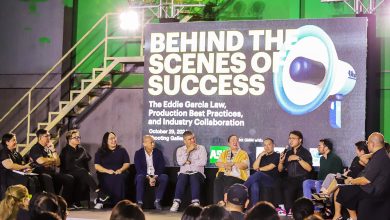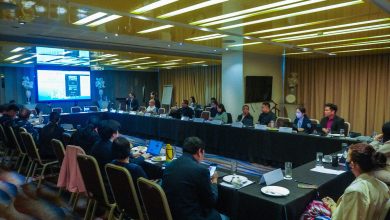by Harry Mosquera
The early bird catches the worm, or so the saying goes.
For Mon and Abby Jimenez, arguably Philippine advertising’s most hardworking couple, being the early bird has helped bring home a bountiful catch – in 2005, about P4B in billings, more or less, for the agency that carries their name.
From their very first job straight out of college as copywriters in the much-storied Ace Compton, to their current jobs as joint CEO’s of the creative juggernaut JimenezBasic, Mon and Abby have always started their day early.
Quite rare in the advertising industry, Mon and Abby make sure that they are in their office by 7:00 in the morning or 8:00 at the latest – the latter time a compromise to the reality of Metro Manila’s rush hour traffic.
“Freshness is the core of our business,” Mon says. “We don’t believe in working late. Working late is a sign of weakness.”
Indeed, they do not encourage their staff to work overtime. As Mon says, “We tell our people to live a life. It’s only advertising, not your life.” Abby concurs: “Our creativity comes from our experiences. It’s what makes our work authentic.”
Creativity is also their underlying philosophy in business. “Creativity is the strategy that we use to build business, especially for our clients,” Mon reveals. And, as Abby also shares, “It matters to us that our advertising works.”
That is why, despite their tremendous success, Mon and Abby are still hands-on managers. They work together – literally – sharing a spacious, if not somewhat Spartan office, with tables-cum-workstations facing each other. With its modern, efficient layout accented by the abstract paintings of friend and fellow advertising veteran Cid Reyes, Mon and Abby’s office reflects the couple’s famously straightforward no-nonsense work ethic. Except, perhaps, for an eccentric painting of a “blue lady” that is very tempting to describe as an intriguing portrait of Abby, which she denies. The painting is by Jennifer Lao Pastor, formerly an Art Director with the agency, but who has now evolved to become a Production Designer.
“We divide our work along project lines,” says Mon. And, despite the expensive billing practices of advertising agencies regarding the involvement of senior people in a project, Mon feels that his and Abby’s involvement is actually the most economical for both the agency and the client.
“We are a compact, lean organization of 116 employees for our billing size,” Mon continues. “Our attitude regarding having the agency CEO’s being part of a project is simple. The biggest expense is really in doing things all over again!”
That is why they aim to get approvals by the first presentation to client, and, as both Mon and Abby are proud to say, their people have a good batting average for approvals at the first try.
Mon and Abby like to point that they also carry creativity in all aspects of agency operations, including managing the careers of their people. They showcase the example of one of their most loyal employees, Francis Eva. “He started as a messenger, and is now involved in IT.” Mon relates, “We took it upon ourselves to upgrade his standard of living. As a messenger, he was only earning so much – now, he is decidedly middle class!”
One of the most innovative incentives that Mon and Abby have applied through the years is travel for their employees. When the holidays come around, the entire agency is abuzz with plans to go abroad, and everyone gets to join, even the janitors.
“One year,” Abby shares, “we went to the British Embassy, but our janitors were denied their visas. Apparently, the Brits didn’t believe that a company will actually sponsor them on vacation!” So, as any proper Filipino boss would do, they decided not to go to London. “Walang iwanan, (no one gets left behind)” Mon says. The entire agency went to Hong Kong instead. This year, everyone is looking forward to holding the company Christmas party in Bangkok.
Mon and Abby’s enlightened management style comes from the heart. “We wanted to show that it can be done.” Mon says. “To be successful… and to share the wealth with the employees.”
Being both strong-willed and highly opinionated individuals, there may be conflicts in business or creative directions. But Abby explains, “Though we are opposites, we complement each other. We’ve been married for over 25 years!”
In cases of conflict, Mon humbly admits, “I always end up losing. But we literally kiss and make up.”
To which Abby says, “We draw inspiration from each other. We keep each other honest.” And with a laugh, she adds, “He has no reason to suspect my motives!”
The Mon-Abby team began as an office romance during their Ace Compton days. It was an atypical romance, Mon clarifies, because though both were copywriters, they did not work together; they handled different accounts.
What Mon loves most about Abby is her sense of humor. And, if Abby were a product, she would be a pair of high heels, because, according to Mon, she is “elegance and function neatly rolled into one.”
If there is anything that he hates about Abby, it’s because “she’s better than me – in golf, or in advertising.” But, he proudly proclaims, “I’m married to the prettiest woman in advertising.”
He may be right. During the interview, Abby, in a black printed wrap dress in the relaxed style of Diane Von Fürstenberg which she matched with intimidating Prada-like heels, looks every inch like a class act.
Abby, in turn, reveals she loves Mon for “his long view of things, and his sense of humor” but she dislikes his eating too much. In fact, if Mon were a product, Abby says, he would be fast food! The implication, of course, is that Mon is a bit heavy around the waist, but this is a bit of exaggeration. Mon, who is dressed smartly in a short-sleeved barong, looks fit and distinguished although more like a serious banker or lawyer rather than the creative advertising executive.
However, Mon and Abby are not all work. When they play, it is to take time for golf on Sunday afternoons at Sta. Elena, or to enjoy the occasional visit to their private sanctuary in Batangas, which Mon describes as his “most favorite place on earth.”
Yet each still manage to pursue their individual passions. For Mon, it is reading books by Bill Bryson, an author that he can identify with because “he’s very interested in life without taking it seriously.” For Abby, it is gardening and caring for her collection of gumamelas. After her stint at Ace Compton, Abby moved on to Pacifica, while Mon stayed behind. When she turned 30 years old, she decided to do something significant: she resigned from her job and put up her own agency, which she started with only a messenger to help her out. The first office of Jimenez and Partners was coincidentally located along Jimenez Street in Salcedo Village. Mon later resigned from Ace to join Abby.
Together, they did their own drawings and art direction. Mon, after all, graduated with a degree in Visual Communications from the University of the Philippines, while Abby, who earned a degree in Psychology from the College of the Holy Spirit, minored in Fine Arts. But as a start-up, their biggest challenge was collection. They had to resort to ingenious collecting techniques, like disguising their voices, to get the money owed them by their clients.
The very first account of Jimenez and Partners was Music Museum, courtesy of Kuh Ledesma’s husband, who was an officemate. But what probably put Jimenez on the advertising map was their work for Selecta Ice Cream.
As Abby relates it, John Concepcion approached Jimenez, upon the recommendation of the late Tony Mercado of Basic Advertising. He appointed it the agency for the ice cream brand, and the rest is history. From about eight percent of the market when Jimenez got the ac-count, Selecta captured 25 percent of the market in two years.
“Magnolia then was all about their name,” Abby recalls. “We went back to the appetite appeal. We used real ice cream in our shoots.” People still remember that signature cherry-dropping-on-the-ice-cream shot at the end of every Selecta commercial. “We used the cherry to communicate quality and something special,” Abby says.
As Jimenez and Partners grew, it attracted the attention of major international players, and soon Jimenez D’ Arcy came into the scene. D’ Arcy recognized Jimenez as the best-run D’Arcy office in the world, conferring it with the Jean Jabes Management Award for Management Excellence. Jimenez D’ Arcy was also recognized by the Philippine 4A’s as one of the best-managed agencies in the Philippines. Both were fitting recognition for all the hard work of Mon and Abby.
When Publicis bought D’ Arcy, a merger between Jimenez and Basic Advertising expected. It was also providential, since both Mon and Abby admit to looking up to Tony Mercado as their inspiration in business, and to Minyong Ordoñez as their creative hero.
Today, JimenezBasic is the largest Filipino advertising agency brand, with clients that are among the biggest and most successful brands in the Philippines. Last year, JimenezBasic shot 174 television commercials, or roughly the output of a mid-size agency based in Los Angeles.
“JimenezBasic is probably our most creative work,” Mon proudly admits. “No one ever merged two large Filipino agencies before.” The first thing that they did was to consolidate the creative departments of the two agencies. The idea was to concentrate on the core of the business, and they unified the two under one creative leadership. They also developed “fusion teams” to force people from both agencies to work together.
“We are now more Filipino than ever before,” Abby points out. “We believe we now offer authentic Filipino advertising. We have multinational clients who would rather keep us and our Filipino perspective over canned formulaic advertising.”
Bench, for example, is a proud success story for Jimenez. And Jollibee, from Basic, is not just another account assignment; it is a Philippine icon that is held in trust for the Filipino. Both Abby and Mon hope that JimenezBasic will eventually find that unique Filipino perspective that will travel abroad.
As to the direction that Philippine advertising is going, Mon believes that the future will have two distinct groups – one that will diversify, creating multitask hydra-headed organization, and one that will specialize, where the organization will be very, very good at a specific service.
“The ones who consolidate will probably win in the end,” Abby predicts. Mon also thinks that advertising will go to people who will focus on communications and their ability to persuade. “Clients,” Mon says, “will still look for the guy who knows how to sell.”
Presently, the announcement of the GMA Network to go into full service advertising underscores the fluidity of the local advertising industry. This scenario has networks that intend to make commercials and place commercials as well. This, however, raises issues of conflict of interest.
“People are now talking more about income,” Mon laments. “There is no substitute for a great idea. The lost media strategy is a good idea,” he stresses.
“When doctors make mistakes,” Mon notes, “they end up in the cemetery. If lawyers make mistakes, they end up in jail. But when we in advertising make a mistake, it ends up on TV!”
Nevertheless, Mon and Abby are optimistic about the young advertising talent of today. “They’re visually oriented,” Abby enthuses. “They’re a whole generation of media children with a natural instinct for pictures and simplicity that our generation never had…. You should know how to liberate them to harness their creativity. You have to bridge the gap of reality, idealism and spirit.”
For all their success, Mon and Abby feel somewhat uncomfortable at the label of legend that is inevitably attached when their names are mentioned. They feel that there is still much to do despite their body of work. Aside from advertising, they are involved in special advocacies, like the Hallmark for LIFE (Leukemic Indigents Fund Endowment) Foundation, which sells cards and uses the proceeds to help children stricken with leukemia.
“Did you know that leukemia in children is curable?” Abby asks. “It only takes about P300,000 worth of medicines to cure children under 14 years of age.” Both husband and wife are also involved in charities for cerebral palsy and autistic children.
If there is any legacy that Mon and Abby would like to leave for their company or the industry, it is hardwork, honesty and integrity. “I like to say that hard work is the lazy person’s path to success,” Mon says, “It’s only when you work hard can you play hard,” Abby agrees.
But most importantly, Mon stresses, “There should be devotion to what we are all about. We were trained to persuade… and when we persuade well, we can make a difference.” And for these passionate persuaders, there are many more worms to catch, with every new day.
This article was published in the September-October 2006 issue of adobo magazine. Harry Mosquera was a former senior correspondent at adobo magazine.









